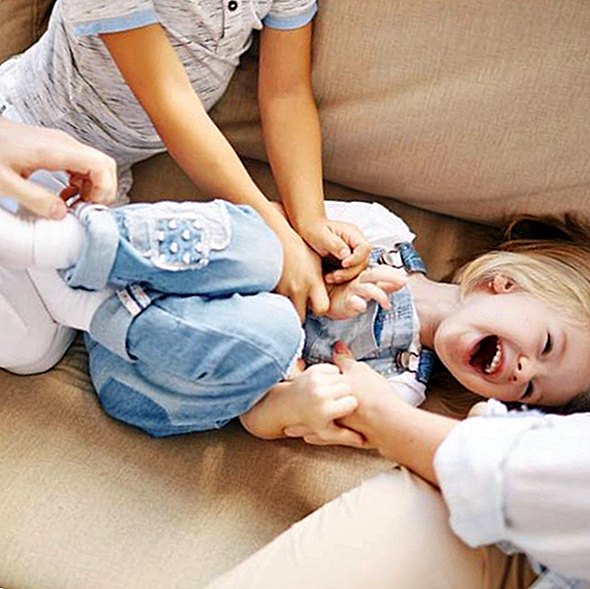You love to tickle children? That's why you should leave that

My definition of "tickle attack":
You hold the child and tickle it through. The child can not get free. It continues, although you realize that the child wants to leave. So this article is about OVERLOOKING tickling. Not for gentle, mindful tickling, of course, there is nothing wrong.
Tickling is NOT funny at all!
I read on Facebook often "Then I tickle my child properly!". In this post I want to tell why I never kidnap my child or what that excessive tickling with our children.
The merciless "tickler"

Our blog favorite: Andrea Schiefer lives with husband and son in Austria and is training as a psychological counselor. On her blog Herzensglückskind she writes about developmental psychology and a loving, respectful communication with children. Their credo: "relationship instead of education". Exciting!
When I was a child, I loved visiting my uncle. Together we experienced the most exciting adventures in the jungle, on the moon or in the desert. His imagination was almost limitless.
But when he became a "tickler" I suddenly felt paralyzed. He then opened his eyes wide and made a funny engine sound. He took a few steps as in slow motion, then suddenly with loud screams rushing to me. The horror began. He grabbed my foot and tickled my soles like crazy. My uncle laughed, I laughed.
In reality, I died a thousand deaths. Because I could not breathe, everything hurt me from laughing. I was completely inferior physically and could not free my foot, as much as I tried.
I wanted to loud "Stop!", "Please stop!", "It hurts me all!" roar, but out of my mouth came only this agonizing, painful laugh.
When he finally let go of my foot, I ran exhausted into my room and no longer understood the world. When I think about it, today I can still feel this unbearable pain (yes, pain!) On my soles.
A dear friend told me a similar story from her childhood. Her mom ran after her every night, just before going to bed and playfully chased her to bed, then she started a tickle attack. Her mother laughed tears. My girlfriend shed tears inside. She felt helpless, hoping it would not last so long this time. She wondered as a child, why those tickle attacks were so bad for her, where her mom had so much fun.
I do not know a single adult who likes to be tickled.
Why do we suppose that our kids have fun with tickle attacks?
Because our kids are laughing? This "laughing" while tickling is usually not a pleasant laugh of joy, but a reflex in the form of involuntary laughter, screaming or twitching.
The kids can not stop laughing before the "tickler" Gekicke finally finishes. Although they laugh at it, they usually suffer. I think it's just like a feeling of pain.
In addition, our children feel completely powerless, because we adults are physically superior to them physically. This overwhelming helplessness often makes children angry and / or anxious.
If we hold our children so that they can not free themselves, this is overblown, although the children laugh at it.
Tickling was formerly even used as a torture tool
"Tickling as torture survived until the Middle Ages and the era of colonial America, but essentially to public humiliation." The "stick" was a special form of the pillory, which was designed to fix the victim's bare feet, with passers-by soles To tickle stimulus itself come after a long time by the laughing and movement reflexes caused lung and muscle pain. " (Source Wikipedia)
Scientifically, there are two types of tickling:
- Knismesis: is a gentle tickling, for example, when someone gently strokes one's skin with a feather. Here we do not have to laugh. I have no objection to that.
- Gargalesis: is an almost painful tickle attack.
What can we offer instead of tickling?
When children express a desire for tickling, this is usually a strategy to meet their need for physical contact.
Possible alternatives:
- For the child predictable and short tickling, for example, in using a song or a rhyme. We pay close attention to our child. We stop immediately when the child withdraws.
- Wild or loving cuddling
- A loving back massage
- The child is the "tickler" and tickles us
I hope I could inspire you with my article, just switch off "tickler".
Text by Andrea Schiefer, originally published on herzensglueckskind.com
Worth reading is also Andreas contribution on "14 ways to strengthen the self-confidence of a child"

Also read
MOM Blogs: Discover the best Mom and Papablogs!Video Recommendation:











